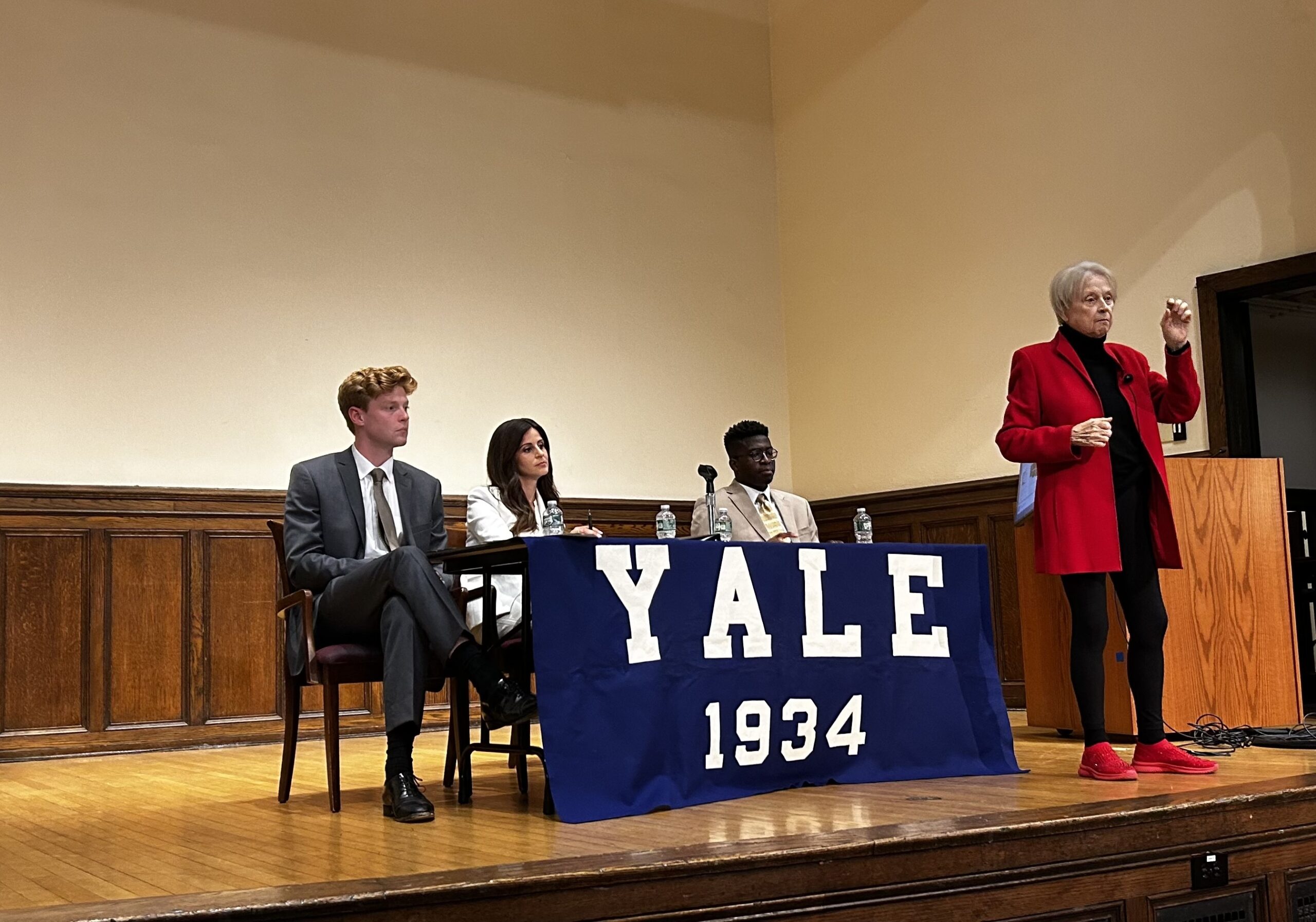Yale Political Union tightening security after Kirk assassination
At Tuesday’s debate, in which the YPU voted 60-31 against the resolution “choice over life,” attendees underwent heightened security precautions.

Orion Kim, Contributing Photographer
The Yale Political Union heightened security for its Tuesday debate following the assassination of right-wing political activist Charlie Kirk last week.
The Tuesday evening event featured prominent pro-life activist Lila Rose and former president of Catholics for Free Choice Frances Kissling. Rose gained prominence in 2011 for her involvement in undercover videos of abortion clinics, which intensified scrutiny of federal funds designated for Planned Parenthood.
Rose was escorted into 53 Wall St., the debate’s venue, by several security guards, and students were instructed to wait outside the building before entering through a security checkpoint. Attendees were scanned with a hand-held metal detector, were told to empty their pockets and could not bring bags into the event.
In his opening remarks, YPU President Brennan Columbia-Walsh ’26 reflected on the slaying of Kirk.
“What happened last week is the antithesis of this organization’s sacred enterprise,” he said.
Columbia-Walsh also said that after the shooting last week, he contacted the YPU’s security liaison to find out whether they “would have to reconsider the semester ahead.”
“We will not allow this to stop the free exchange of ideas, no matter the fact that new precautions and protections will be required,” Columbia-Walsh said, referring to what the security liaison told him.
Last week, the night before Kirk was killed, the YPU voted against the resolution “violence is never the answer.”
YPU votes against ‘choice over life’ resolution
After Columbia-Walsh’s opening remarks, Kissling delivered her opening argument in front of the packed lecture hall.
Rather than standing at the podium, she stood at the front of the stage and began her speech by discussing the static and polarized state of abortion debates since she began her work in the 1970s.
Kissling defined two moral stances: those who view abortion as the killing of a human and those who defend unregulated choice.
“The outcome of these two polar opposites is almost never conversation. It never changes anybody’s mind,” she said.
Instead, Kissling emphasized the importance of the “independent women,” rejecting both extremes. She insisted that women deserve the freedom to make these decisions without being reduced to instruments of conservative population policy or moral ideology.
“I tend to favor more the value of women’s lives, their health, their partners, their children, and that value becomes especially important if and when they become pregnant, particularly when they didn’t intend to,” Kissling said.
She also drew from her Catholic background, providing examples of how religious doctrines have evolved to argue that moral systems change as people learn to “think more critically.”
In her final remarks, Kissling acknowledged that giving birth is a “beautiful thing” but challenged men in the room to raise their hands if they would be willing to carry and birth a baby themselves. Only two men in the room raised their hands, and one more on the condition that “God decided it so.”
After a period of questioning from the audience, Rose made her case for why abortion should be both morally condemned and legally criminalized under all circumstances.
She opened by referencing the body of a baby found in a closet in Lexington, Ky., last week, whose mother was arrested in connection with the death, using it to frame her central claim that abortion is the intentional killing of a living human being and should not be excused any more than other forms of murder.
Rose argued that from conception onward, the entity in the womb is a fully valuable human life. She also insisted that an embryo at six weeks is just as valuable as one at 26, and that science confirms life begins at conception.
In a claim that drew many hisses from the audience, she compared abortion to historical examples of people being deemed “subhuman,” including Jews during the Holocaust, slavery, and Israel’s ongoing war in Gaza.
“When you strip people of their humanity, you open the door to every kind of violence,” she declared.
Rose also asserted that the right to bodily autonomy should not justify abortion, arguing that autonomy cannot extend to the destruction of another person’s life.
“True women’s empowerment cannot come from the bloodshed of our killing,” Rose said.
Instead, she insisted on proper support and pregnancy resources for women facing unintended pregnancies.
Finally, Rose addressed Kissling’s point about men’s unwillingness to experience pregnancy and subsequent lack of right to determine if a child is born. “Men have a responsibility, as women do, to the care of unborn children, and that should start with paying child support during pregnancy,” she said.
After the two speeches, the two guest speakers had the opportunity to ask each other questions in a forum unique to Tuesday’s debate.
During the cross-examination, Kissling framed abortion as a matter of balancing values, while Rose maintained that abortion is always an intentional killing of an innocent life.
For the last portion of the debate, the audience heard from four students, two representing each side of the issue.
At the end of the debate, the YPU voted 60-31 against the resolution “choice over life,” after contentious stomping and hissing throughout the event from the audience on both sides of the issue.
Next week’s YPU debate at 53 Wall St. will feature former Pennsylvania Senator Rick Santorum on the resolution “pray in schools.”







